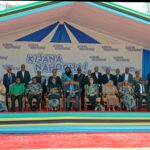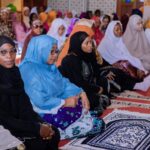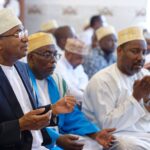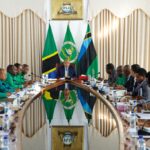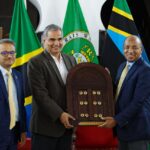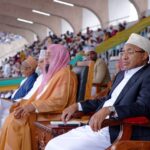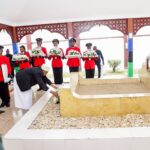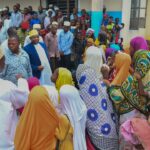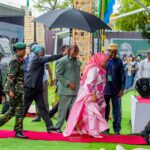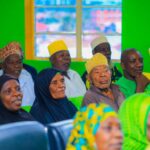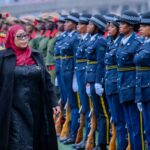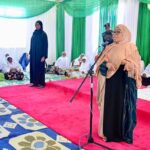The President of Zanzibar and Chairman of the Revolutionary Council, Hon. Dr. Hussein Ali Mwinyi, has issued a call to politicians to engage in a competitive process aimed at enhancing social services for citizens in a progressive manner. President Dr. Mwinyi has elucidated that if he has constructed a hospital in every district and improved various social services, it should be a competition and not a source of contention that could potentially lead to conflict.
These remarks were made by President Dr. Mwinyi during the inauguration and opening of the staff houses of Abdullah Mzee Hospital, South Pemba Region, on 1 July 2024. Furthermore, President Dr. Mwinyi exhorted the populace to persevere in safeguarding, upholding, and maintaining peace and stability, and to engage in fervent supplication for the country in the forthcoming general election.
President Dr. Mwinyi has indicated that, in the remaining year period, the government will prioritise improvements in the health sector. This will include the provision of enhanced health services, the construction of regional hospitals, and the development of a large international referral hospital in Binguni.
Furthermore, President Dr. Mwinyi has indicated that the government will continue its efforts to construct housing for health workers in the Unguja and Pemba districts.
Conversely, President Dr. Mwinyi expressed gratitude towards the Chinese Government for their continued assistance to Zanzibar, particularly in the health sector. This was evidenced by the completion of the project to provide housing for staff at the Abdullah Mzee Hospital, which cost 16.5 billion Tanzanian shillings.
President Dr. Hussein Ali Mwinyi Calls for Constructive Political Competition to Enhance Social Services
The President of Zanzibar and Chairman of the Revolutionary Council, Hon. Dr. Hussein Ali Mwinyi, has issued a compelling call to politicians, urging them to engage in constructive competition with the goal of enhancing social services for citizens in a progressive manner. President Dr. Mwinyi underscored the importance of viewing achievements in social services, such as the construction of hospitals and the improvement of various other services, as a healthy competition rather than a source of contention that could potentially lead to conflict.
A Vision for Progressive Social Services
In his inaugural address at the opening of the staff houses at Abdullah Mzee Hospital in the South Pemba Region on 1 July 2024, President Dr Mwinyi set forth his vision for the future of the hospital. In his address, he emphasised the necessity for political leaders to direct their efforts towards tangible improvements that directly benefit the citizens. He emphasised that the construction of hospitals in every district and the enhancement of social services represent significant achievements that should motivate politicians to pursue excellence rather than engage in divisive politics.
“Let us compete in a manner that brings progress and development to our people,” President Dr. Mwinyi stated. “If I have constructed a hospital in every district and improved various social services, it should be a competition that fosters growth and not a source of contention that could lead to conflict.”
Commitment to Health Sector Improvements
In his address, President Dr. Mwinyi reaffirmed the government’s dedication to prioritising enhancements in the health sector over the remaining year of his term. He set forth a comprehensive plan comprising the enhancement of health services, the construction of regional hospitals, and the provision of superior facilities and resources for healthcare professionals. The objective of this initiative is to guarantee that all citizens have access to quality healthcare, regardless of their geographical location.
“The health sector is a cornerstone of our development agenda,” President Dr. Mwinyi said. “We are dedicated to ensuring that every citizen has access to quality healthcare services. This includes the construction of new hospitals, the upgrading of existing facilities, and the provision of necessary resources to our healthcare professionals.”
Encouraging Peace and Stability
In addition to his remarks on healthcare, President Dr. Mwinyi urged the citizens of Zanzibar to persevere in their efforts to safeguard and reinforce national peace and stability. He underscored the significance of unity and collaboration, particularly in view of the impending general election in the near future. He encouraged citizens to engage in collective prayer for the country and to collaborate in order to foster a peaceful and stable environment.
“Peace and stability are the foundations of our progress,” President Dr. Mwinyi remarked. “As we approach the general election next year, I encourage all citizens to continue to protect and maintain peace. Let us pray for our country and work together to ensure a stable and prosperous future.”
A Call for Constructive Political Engagement
President Dr. Mwinyi’s appeal for constructive political engagement represents a pivotal advance in the cultivation of a culture of healthy competition among politicians. By concentrating on concrete enhancements in social services, political leaders can illustrate their dedication to the well-being of the citizenry. This approach not only enhances the quality of life for the people but also strengthens the democratic process by encouraging accountability and transparency.
“Constructive political engagement is essential for our nation’s progress,” President Dr. Mwinyi stated. “I urge all politicians to focus on providing enhanced social services and to engage in a competition that benefits our citizens. Let us work together to build a better future for Zanzibar.”
The Role of Citizens in Nation-Building
Additionally, President Dr. Mwinyi emphasised the pivotal role that citizens play in the process of nation-building. He urged the population of Zanzibar to engage actively in the process of nation-building by supporting government initiatives and holding leaders to account. He underscored the necessity of a collaborative approach between the government and citizens to achieve sustainable development and progress.
“Nation-building is a collective effort,” President Dr. Mwinyi said. “I encourage all citizens to actively participate in the development process. Support government initiatives, hold leaders accountable, and work together to achieve sustainable development. Together, we can build a prosperous and thriving Zanzibar.”
Investing in Education and Infrastructure
In addition to the focus on healthcare, President Dr. Mwinyi outlined plans to invest in education and infrastructure. He placed particular emphasis on the necessity of providing the younger generation with a high-quality education, given their role as future leaders of the nation. Furthermore, he emphasised the necessity for enhanced infrastructure to facilitate economic growth and development.
“Education is the key to our future,” President Dr. Mwinyi stated. “We are committed to providing quality education to our youth, ensuring that they have the skills and knowledge needed to lead our nation.”
Understanding the Importance of Social Services
What Constitutes Social Services?
The term “social services” encompasses a wide range of public services provided by the government, non-profit organisations, and private entities. The aforementioned services include:
-
Healthcare: Access to medical facilities, preventive care, and treatment.
-
Education: Quality schooling, vocational training, and higher education opportunities.
-
Infrastructure: Development of roads, bridges, water supply, and sanitation systems.
-
Social Welfare: Programs aimed at supporting vulnerable populations, such as the elderly, disabled, and low-income families.
Impact on Community Development
The provision of enhanced social services has a significant impact on the overall development of a community. To illustrate, the availability of high-quality healthcare services has been demonstrated to result in a reduction in mortality rates and an enhancement of productivity. Similarly, a robust education system provides individuals with the requisite skills to contribute to the economy. Improved infrastructure enables greater trade and mobility, while social welfare programmes guarantee that no individual is left behind.
Case Studies
The case of the Nordic countries illustrates the impact of substantial investment in healthcare and education on enhanced life expectancy and literacy rates. Singapore’s transformation from a developing nation to a global economic powerhouse through strategic investment in social services provides another example of the benefits of such policies.
Strategies for Politicians to Compete Effectively
Identifying Key Areas for Improvement
Prior to implementing any social service enhancements, it is essential that politicians identify the critical areas where such enhancements are most needed. This necessitates the implementation of comprehensive assessments in order to identify the gaps and to prioritise the interventions.
Developing Actionable Plans
Once the key areas have been identified, the subsequent step is to develop clear and actionable plans. The aforementioned plans should delineate specific objectives, timeframes, and resource allocations. To illustrate, a plan to enhance healthcare may encompass the construction of new hospitals, the training of medical personnel, and the allocation of greater financial resources to preventive care.
Building Partnerships
The collaboration with local and international organisations can significantly enhance the efficacy of development initiatives. Collaborations with entities such as the World Health Organization (WHO) or the United Nations Children’s Fund (UNICEF) can facilitate the provision of technical expertise, financial resources, and other forms of support.
Engaging with the Community
It is of the utmost importance to comprehend the requirements and concerns of the community. It is recommended that politicians engage with citizens through town hall meetings, surveys and focus groups in order to gather input and ensure that development projects align with the community’s needs.
Implementing Development Projects
Steps to Initiate Projects
The initiation of development projects necessitates the completion of a number of key steps:
-
Planning: Detailed project plans should be created, outlining objectives, timelines, and budgets.
-
Funding: Securing adequate funding through government budgets, grants, or private investments.
-
Execution: Implementing the project according to the plan, ensuring adherence to quality standards.
-
Monitoring: Regularly tracking progress to ensure the project stays on course.
Best Practices for Project Management
The effective management of projects is a crucial factor in the success of development initiatives. This encompasses the establishment of transparent objectives, the maintenance of transparent communication channels, and the capacity to adapt to changes.
Overcoming Challenges
The implementation of projects is often beset with challenges, including budgetary constraints, delays and resistance from stakeholders. Such issues can be addressed through the implementation of a proactive risk management strategy, the maintenance of transparent communication channels, and the engagement of relevant stakeholders.
Examples of Successful Projects
One noteworthy example is the “Water for Life” project in Tanzania, which was successfully implemented to provide clean drinking water to rural communities through a combination of strategic planning and community involvement.
Measuring and Communicating Success
Evaluating Impact
The evaluation of the impact of social service improvements necessitates the utilisation of a range of tools and metrics. Such indicators may include health indicators, educational attainment levels, and infrastructure quality assessments.
Tools and Metrics
The most commonly employed tools and metrics for measuring success include:
-
The field of health metrics encompasses a range of indicators that provide insight into the health of a population. These include mortality rates, disease prevalence, and patient satisfaction. The following metrics are considered: mortality rates, disease prevalence, and patient satisfaction.
-
Education Metrics: Enrolment rates, graduation rates, and literacy levels.
-
Infrastructure Metrics The quality of the road network, the reliability of the water supply, and the extent of sanitation coverage.
Communicating Achievements
It is of paramount importance to effectively communicate achievements to the public and stakeholders. Such communication can be achieved through the use of press releases, social media updates, and public reports. The establishment of transparency and accountability in reporting progress serves to foster trust and support for both ongoing projects and future initiatives.
In conclusion, President Dr. Hussein Ali Mwinyi’s call for constructive political competition and his vision for enhanced social services represent significant steps towards the development of a prosperous and thriving Zanzibar. The government’s objective is to enhance the quality of life for all citizens by prioritising tangible improvements in healthcare, education, infrastructure and economic growth. Furthermore, the prioritisation of peace, stability, governance, accountability and the empowerment of women and youth highlights the necessity of a collective approach to nation-building. As Zanzibar approaches the general election next year, it is of the utmost importance that all citizens work together to ensure a peaceful and stable environment, and to support the government’s initiatives for sustainable development and progress.
“Together, we can build a prosperous and thriving Zanzibar,” President Dr. Mwinyi concluded. “Let us collaborate to realise our collective vision for a brighter future for all citizens.”
Tanzania Media
- Kanyala Ferry Launch: TEMESA’s New Service for 15,000 Sengerema Residents (Mwanza) - 18 August 2025
- Russia-Tanzania Naval Cooperation: How the Smolny Training Ship Boosts Dar es Salaam’s Maritime Security - 18 August 2025
- Tanzania’s ICGLR Commitment: Stabilising the DRC & Great Lakes Region - 18 August 2025









